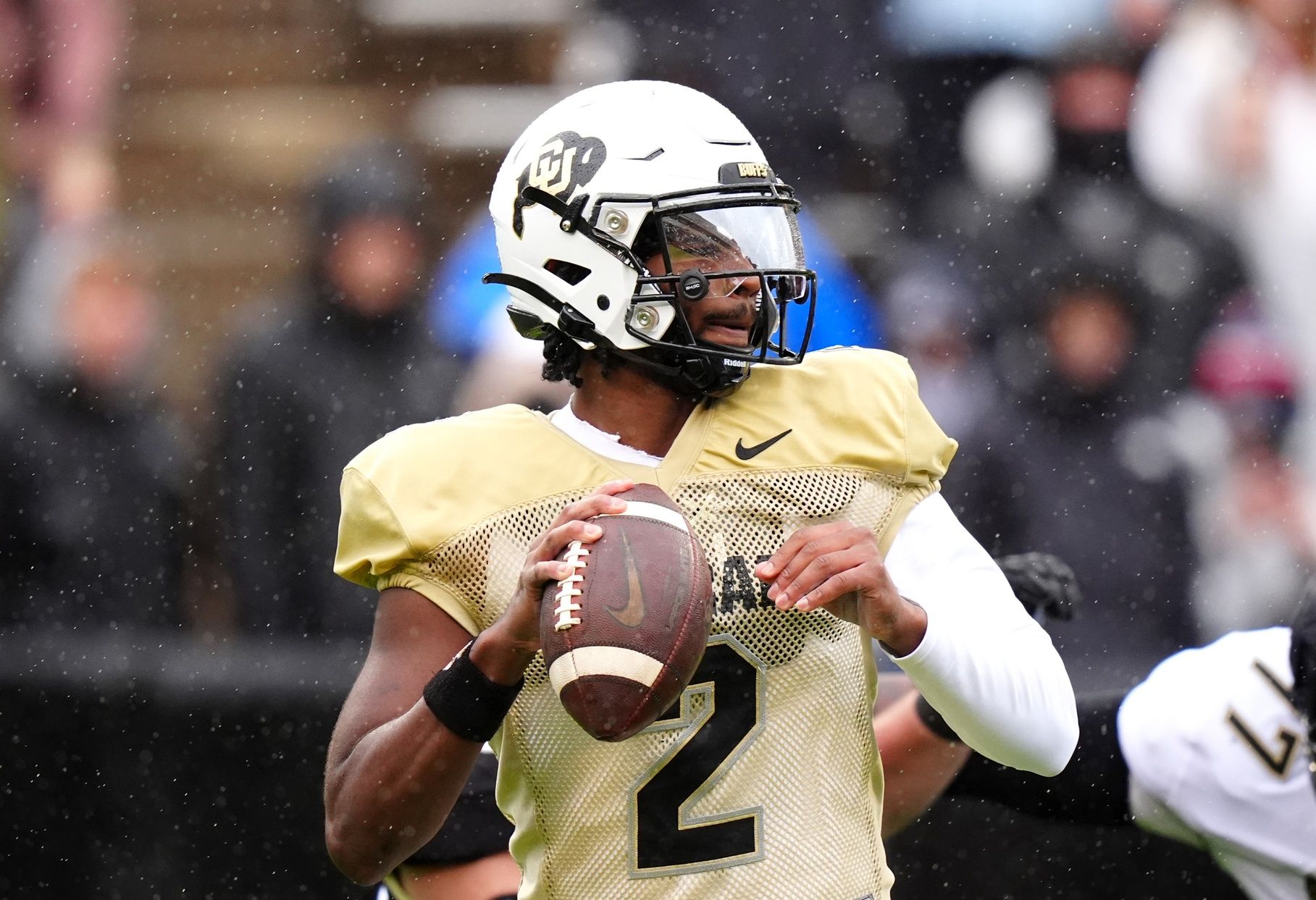Deion Sanders, Shedeur Sanders, Travis Hunter, and the entire Colorado football program have fallen under controversy in light of a revelation about the team’s culture, made more glaring by the former’s reaction on social media. But how might this saga affect the 2025 NFL Draft stock of Sanders and Hunter?
Social Media Antics of Deion Sanders, Shedeur Sanders Call 2025 NFL Draft Stock Into Question
In case you aren’t caught up on the latest Colorado controversy, here’s a short cliff-notes version of what’s happened to this point.
Deion Sanders became the Colorado Buffaloes head coach ahead of the 2023 college football season. He brought his son Shedeur and former five-star recruit Hunter with him from Jackson State.
Early on, Sanders accelerated media buzz surrounding the program with his blunt communication and brazen confidence — confidence that, at first, appeared validated after a season-opening win against the TCU Horned Frogs, who’d made the College Football Playoff a year prior.
The Buffaloes started the season 3-0, but they eventually lost eight of their nine final games, before closing out the year with a record of 4-8. Sanders invested heavily in the transfer portal ahead of the 2023 season, and the turnover has only increased in 2024.
Through the offseason, the Buffaloes — through the spring game and up to the present — have lost 53 scholarship players back to the transfer portal. And in late April, The Athletic’s Max Olson wrote a piece chronicling the stories of some of Colorado’s outgoing transfers, who spoke at length about Sanders’ dehumanizing style of leadership as a coach.
The story helped catalyze a clash between Colorado fans and other college football fans on social media. And both Deion and Shedeur eventually joined in on disparaging outgoing transfers.
The elder Sanders quoted a post highlighting a transfer’s stats and, at one point, responded to criticism by touting his son as a future top-five NFL Draft pick. Meanwhile, the younger Sanders remarked about not remembering another outgoing transfer and referring to him as “mid.”
There’s a lot of noise that comes with this story. To summate, there are concerns about the culture within Colorado football, and the actions of the Sanders family on social media don’t quell these concerns. A head coach should conduct himself differently. That much is clear, but could this saga affect the younger Sanders’ 2025 NFL Draft stock down the line?
Analyzing the Effect of Colorado’s Social Media Saga on Shedeur Sanders, Travis Hunter
In short, the elder Sanders isn’t exclusively hurting the younger’s stock with his social media antics — but the fact that Shedeur appears to be joining in on and perpetuating some of the culture’s toxic tendencies is a major red flag.
On the field, there’s merit to Sanders being a potential early-round pick. He completed almost 70% of his passes for 3,230 yards, 27 touchdowns, and just three picks last season. Sanders has good baseline talent and accuracy, but his raw physical talent isn’t elite, which makes the intangibles and character all the more important.
Character is always an essential component of every prospect’s evaluation. For a quarterback prospect expected to at least be in the early-round conversation, it’s incredibly vital.
At the NFL level, a starting QB isn’t just a part of the lineup. Often, quarterbacks are relied upon to be leaders of their respective units. Not only are they logistical and strategic leaders — coordinating countless moving parts on every down — but they’re emotional leaders for the team as well, and their cultural footprint is very large by design.
NFL teams draft young QBs — ones like Caleb Williams, Jayden Daniels, Drake Maye, Michael Penix Jr., J.J. McCarthy, and Bo Nix — to be the face of their franchise. There’s a lot of inherent responsibility that comes with that, and thus, many character and personality traits that teams look for in their search.
There’s more than one type of personality that can be successful at the NFL level. Usually, though, you see a number of common threads among the most successful NFL passers and franchise leaders: Self-accountability, humility, empathy, constructive leadership, and careful communication.
At the very least, Sanders’ posts on social media could hint that he lacks some of these qualities as a team leader. For NFL teams with an eye on the early 2025 NFL Draft QB class, he could end up not meeting the qualifications of a franchise QB because of this.
To be fair, every quarterback’s path to maturation is different. Geno Smith’s early troubles with leadership as a member of the New York Jets resulted in an altercation with a teammate early in his NFL career. Years later, he was able to rectify his mistakes. Smith not only became a Pro Bowl-caliber QB in Seattle, but his leadership is now a visible strength.
Development — both physical and mental — is not linear, and no one will fault Sanders for needing more. But at the same time, the prospect of investing first-round capital in Sanders is looking more and more trepidatious, because he (along with his father) may be contributing to the cultural issues that are corroding Colorado’s locker room.
It’s also important to remember, however, that team culture and individual character are not one and the same. On the surface, Hunter hasn’t appeared to join in on the social media controversy, so it likely reflects worse on Sanders than it does on him.
It’s important to approach these issues on a case-by-case basis. Hunter is also viewed to be an early first-round candidate in the 2025 NFL Draft. In his case, there’s no reason to change that right now.
In Sanders’ case, however, it may be different — and it’s up to him to change that. But changing that will require introspection — something that hasn’t been a strength of either Deion or Shedeur Sanders to this point.

